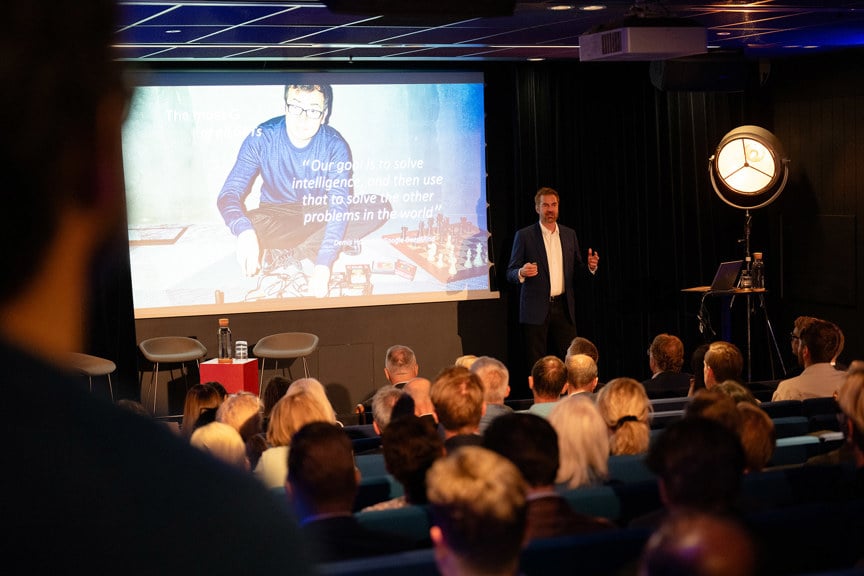Sweden a potential front-runner in AI
Artificial intelligence (AI) is fundamentally transforming how we work, produce and create value. However, while the technology is advancing at an exponential pace, changes in productivity and societal structures are occurring much more slowly. In this shift, Erik Brynjolfsson – professor at Stanford and an internationally influential voice in AI and economics – sees Sweden as a potential front-runner. But this will only be possible if the right conditions are put in place.
During a presentation at IVA’s Business Executives Council in Stockholm, Erik Brynjolfsson compaired the impacy of AI to earlier technological revolutions, such as the breakthroughs of electricity and the steam engine. The crucial difference, he argued, is that AI does not replace muscle power but cognitive tasks – meaning its consequences will be both deeper and more far-reaching.

Sweden, with its strong digital infrastructure, high levels of education, and widespread societal trust, has – according to Brynjolfsson – the potential to become a leading player in the AI revolution. But the path i far from guaranteed. He highlights what he calls the productivity paradox: despite increased investments in AI and automation, we have yet to see a corresponding rise in productivity.
"We often see the technology, but not the invisible complements required for it to have an impact: new skills, new business models, new ways of working," said Brynjolfsson.
History shows that productivity gains often take time to materialise following major technological leaps. Brynjolfsson notes that it has previously taken up to 40 years for such gains to be realised, but believs AI could shorten that timeline to between 5 and 10 years – provided we act decisively. We tend to be good at predicting technological development, but our assumptions about social and cultural change often lag behind.
Professor Amy Loutfi, IVA Fellow, Pro Vice-Chancellor for AI at Örebro University and Programme Director for WASP, addressed this very point in a panel following the presentation. She illustrated it with a film from the 1950s that attempted to predict the future: video meetings, online shopping and digital payments were all included – but always charged to the man's account. A clear example of how norms and gender roles do not always evolve in step with technology.

Sylvia Schwaag Serger, President IVA, Amy Loutfi and Erik Brynjolfsson.
Loutfi emphasised that AI truly has the potential to drive major efficiency increases and new ways of working – but that its true potential is only unlocked when we are also prepared to re-examine our values and assumptions. She stressed the interplay between technology, culture and values.
While Brynjolfsson sees great potential in Sweden, he also warns against passivity. The countries that move fastest will also reap the greatest share of the value AI can generate, he argues. Already today, American companies that have integrated AI effectively are showing clear productivity gains, while others are falling behind.
"Sweden has an opportunity – but it is time-limited. Education, policy, and leadership must work together to jointly generate impact – otherwise, the value will be lost," he emphasised.
Brynjolfsson particularly underscored the importance of clear policy. Technological innovation is not value-neutral – it affects power dynamics, distribution, and social cohesion. AI can amplify both opportunities and inequalities. That’s why proactive policy is needed – one that focuses not only on efficiency, but also on fairness.
With its innovation climate, strong welfare institutions, and high trust in public authorities, Sweden has a unique chance to shape an AI development that is both economically powerful and socially sustainable. But this requires courage, deliberate investment – and above all, a clear national strategy.
Loutfi highlighted the need for collaboration at a time when polarised debates risk stalling progress.
"One of the worst things we can do in today's global situation is to let disagreement lead to paralysis. That’s why we need to collaborate – both nationally and internationally," she stressed.
Brynjolfsson concluded his presentation with a clear message:

"With great power comes great responsibility. AI can generate enormous value – but also deepen divides. It is up to us to choose the path forward."

